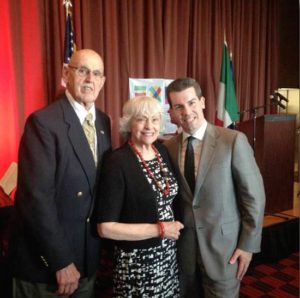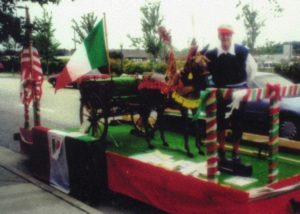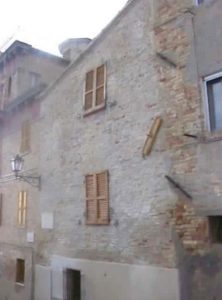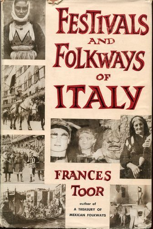Shirley Martignoni Fedeli, formerly of Amici Italiani of Rockford, IL, now living in Michigan with her husband Gene, was recently awarded one of Italy’s highest honors. The President of Italy, Sergio Mattarella, has conferred upon Shirley Martignoni-Fedeli the most prestigious honor of Cavaliere dell’ Ordine della Stella d’Italia (Knight of the Order of the Star of Italy). The distinction is bestowed upon individuals of Italian heritage living outside of Italy for extraordinary contributions to the preservation of the Italian spirit and  promotion of Italy’s prestige and friendly relations with other countries through various activities. It is the highest honor the Italian government can bestow upon a person of Italian heritage residing outside of Italy.
promotion of Italy’s prestige and friendly relations with other countries through various activities. It is the highest honor the Italian government can bestow upon a person of Italian heritage residing outside of Italy.
The ceremony took place on June 2, 2015 at the National Italian- American Sports Hall of Fame on Taylor Street in the heart of Chicago’s Little Italy. Italy’s elected representative for Italian citizens living in North and Central America, Senatore Renato Turano, presented the Ribbon and Medal of the Order to her. The event was sponsored by the Italian Consulate of Chicago.
Shirley’s recognition by the Italian government was for 30 plus years of promoting and preserving Italian heritage and culture in Rockford, Illinois. She is a charter member of the Greater Rockford Italian American Association (GRIAA) and currently serves as director emeritus. Continue reading “Shirley Martignoni Fedeli Honored by Italian Government”



 Unfortunately we all know that the speed of modern life can make it difficult to appreciate and give proper due to the old traditions and know-how of cabinet makers, inlayers, embroiderers, upholsterers, restorers, ceramicists, and shoemakers, among others. Artisans, their traditional workshops, and thus a small piece of history are unfortunately slowly disappearing throughout Italy.
Unfortunately we all know that the speed of modern life can make it difficult to appreciate and give proper due to the old traditions and know-how of cabinet makers, inlayers, embroiderers, upholsterers, restorers, ceramicists, and shoemakers, among others. Artisans, their traditional workshops, and thus a small piece of history are unfortunately slowly disappearing throughout Italy. Well, rather than lament the state of affairs, our new friends at
Well, rather than lament the state of affairs, our new friends at 